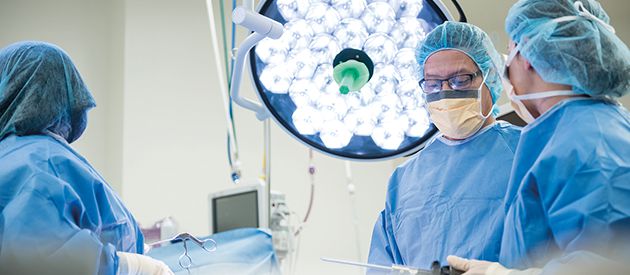From introductions with a stranger and writing, to eating and dressing, our hands are the centerpieces to our daily routines.
When our hands have problems, immediate care must be pursued to repair function and ensure the tissues are not damaged. At Specialty Surgical Center, we specialize in hand surgery for conditions such as arthritis, carpal tunnel, fractures, and tendon injuries. If surgery is required, our surgeons are trained in performing the following procedures:
Carpal Tunnel Release
This minimally invasive procedure alleviates numbness and tingling in the wrist caused by carpal tunnel syndrome. Depending on the severity of the patient’s condition, a physician at Specialty Surgical Center may use different techniques to alleviate pressure on the median nerve. Also called carpal tunnel surgery, there are two different ways a physician may perform the procedure: using an open or endoscopic surgical technique. The physicians at Specialty Surgical Center typically perform this surgery using an endoscopic approach because it often results in minimal blood loss, less post-operative pain, and a quicker recovery. Talk to your physician to learn more about this procedure.
Fasciotomy
A fasciotomy is a surgical procedure performed on patients who suffer from compartment syndrome. During the procedure, a Specialty Surgical Center physician will use surgical instruments to remove a portion of the patient’s fascia to alleviate pressure in the affected limb. A fasciotomy may be performed on patients who have sustained a serious injury, such as crushed or severely impacted bones, severe burns, or in people who suffer from complications due to their weight (in other words, this procedure is common in severely overweight and morbidly obese individuals). Talk to a physician at Specialty Surgical Center to learn more about undergoing a fasciotomy.
Nerve/Tendon Repair
This surgical technique treats torn or severely damaged tendons by sewing the torn ends of the affected tendon together, bringing movement back to the joint. The shoulders, elbows, fingers, and knees are the most common tendons that require this surgery because limited movement to these joints can significantly impact a patient’s quality of life. That’s why the team at Specialty Surgical Center recommends patients undergo this procedure so they can restore their function and mobility. Because nerve and tendon repairs are performed on an outpatient basis, patients can return home shortly after the procedure. More often than not, physical therapy is necessary to return to a normal level of function.
Skin Grafts
When a patient sustains a severe burn, injury, or illness that results in the loss of vital skin and tissue, he or she may need to undergo skin grafting. This surgical procedure removes healthy skin from one part of the body and uses it to repair the damaged portion of skin and tissue on another part of the body. As we mentioned previously, skin grafts are common in patients who suffer from skin infections, severe burns, open wounds, large bed sores, and skin cancer. During the procedure, a Specialty Surgical Center physician will likely administer general anesthesia so the patient doesn’t feel any discomfort. After the procedure, patients will be sent home to recover. Before leaving our surgery center, your physician will provide aftercare instructions and schedule a follow-up appointment to reduce the risk of surgical complications.
Wrist Arthroscopy
This minimally invasive surgery diagnoses and treats conditions and injuries affecting the wrist. For example, patients who suffer from wrist fractures, ganglion cysts, ligament and muscle tears, and carpal tunnel syndrome may undergo wrist arthroscopy to correct these ailments, significantly reducing pain while improving mobility and function. During the procedure, a Specialty Surgical Center (SSC) physician uses a small surgical instrument with a camera attached called an arthroscope to identify pain points and correct underlying issues. Your SSC physician will discuss different aspects of the procedure before your scheduled surgery date so you can ask any questions you may have. Moreover, he will explain whether or not this procedure is more diagnostic or corrective in nature.
